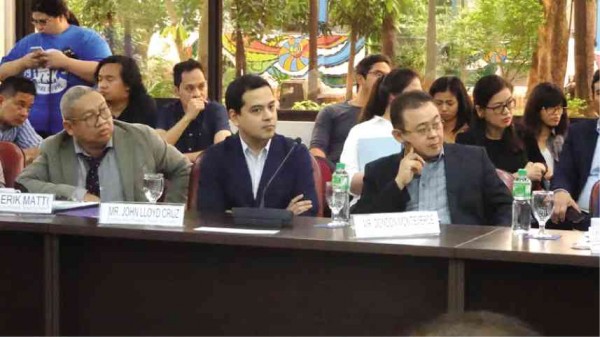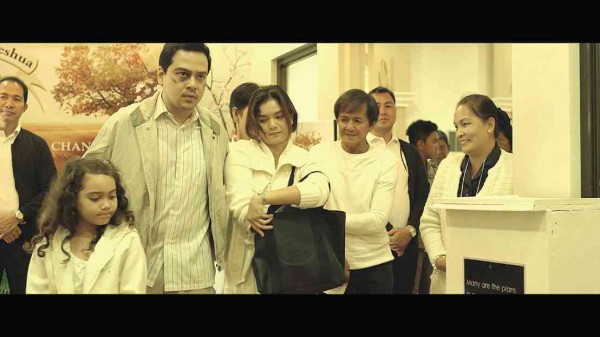What’s next for the MMFF?

FROM LEFT: director Erik Matti, actor John Lloyd Cruz and producer Dondon Monteverde at the hearing Abigail de la Cruz
As a result of two hearings held in Congress last week, reforms are underway for the Metro Manila Film Festival (MMFF), which was rocked by controversies last month.
On Wednesday’s session, the formation of a “technical working group,” composed of industry stakeholders, was proposed. The group will study the rules governing the MMFF, its composition and administration.
“It’s a victory, but this is only the first step,” says Dondon Monteverde, producer of the Erik Matti film, “Honor Thy Father,” which was disqualified in the festival’s best picture race.
The disqualification eventually led to the congressional inquiry spearheaded by Rep. Dan Fernandez, who is also an actor and cast member of “Honor Thy Father.”
Monteverde explains: “There is a need to amend MMFF rules that were formulated in the 1970s—these regulations are passé. We need new guidelines that are relevant to the times.”
Article continues after this advertisementAs an example, “Honor Thy Father” was disqualified by the MMFF executive committee because it had been shown in the Cinema One and Hawaii film fests.
Article continues after this advertisementMonteverde points out that Brillante Ma. Mendoza’s “Thy Womb” was allowed to compete in the 2012 MMFF, even though it had its premiere at the Venice fest earlier that same year.
Crucial issue
But the more crucial issue, Monteverde notes, is producing local films that are of international caliber. “How can we make MMFF entries globally competitive if we exclude films that were shown abroad?”
Another concern is how entries that underwent revision were not penalized even though drastic changes in the script and casting are not allowed, says Monteverde.
“Rules are only followed if they suit certain interests,” Matti asserts.
That is precisely what Matti and Monteverde are fighting for: Fairness and transparency, they clarify.
“There is a need to revamp the MMFF leadership,” Matti says.
“The truth came out,” Monteverde says. “A jury member (Carmen Musngi, a board member of the Movie and Television Review and Classification Board) was able to shed light on what really happened.”
During the first hearing on Monday, Monteverde recounts, Musngi revealed that two members of the executive committee (Dominic Du and Marichu Maceda) had informed the jury about the disqualification of “Honor Thy Father” on Dec. 21, when the case was only decided by the execom on Dec. 26.
Sought to comment on the congressional hearings, Maceda, spokesperson of the MMFF executive committee, said the execom will meet on the matter before issuing a statement.
John Lloyd’s take
On the second hearing on Wednesday, “Honor Thy Father” lead actor John Lloyd Cruz expressed his take on the matter: “These controversies can divide us—or it can serve as a way for us to unite, make changes and strengthen the film industry. Reforms are needed. We hope that this will lead to laws that will benefit Philippine cinema.”
“He was emotional, but was very interested and concerned,” Monteverde recalls.
If only for the fact that these issues were brought out in the open, it made the distress and disappointment of the last few weeks seem worthwhile.
Matti admits that he initially felt dissuaded. “Last Monday, I asked myself: Are we the only ones willing to speak up? But when I saw that there were many people in the session hall, I felt encouraged. There is no need to take sides—we just want people to listen and hopefully do something about the industry’s problems.”
Monteverde agrees: “We need to remain vigilant. We have to protect the film industry.”
The next step, says Monteverde, is a more detailed inquiry into the finances of the festival. The Commission on Audit can now look into the fest’s books, he says.
Noemi Ilagan, executive director of the MMFF Secretariat tells the Inquirer: “Based on the Metro Manila Council Executive Order No. 86-09, the MMFF earnings are divided, accordingly: Movie Workers Welfare Foundation (Mowelfund), 50 percent; Film Academy of the Philippines, 20 percent; Motion Picture Anti-Film Piracy Council, 20 percent; Optical Media Board, 5 percent; and Film Development Council of the Philippines, 5 percent.”
“Some beneficiaries have yet to receive funds from the MMFF,” Monteverde says. “The financial support is divided into six tranches. In the meantime, movie workers cannot avail of much-needed assistance!”
RELATED VIDEOS
